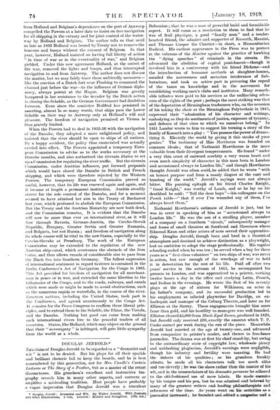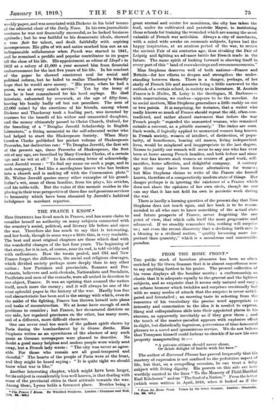DOUGLAS JERROLD.•
Tut: claim of Douglas Jerrold to be regarded no a "dramatist and wit " is not to be denied. But his plays for all their sparkle and brilliant rhetoric fail to keep the boards, and he is best remembered by this generation, not for Mrs. Caudle's Curtain Leetures or The Story of a Feather, but as a master of the retort discourteous. His grandson's excellent and instructive bio- graphy reveals him in many other aspects, and corrects or amplifies a misleading, tradition. Moat people have probabby a vague impression that Douglas Jerrold was a truculent
• Donolar Jerrold : Dramatist and Wil. and other Illuatralions. 2 cola. London : . .
Bohemian ; that he was a man of powerful build and formidable aspect. It will come as a revelation to them to find that be was of frail physique, a good "family man" and a tender- hearted friend, the admirer and supporter of Kossuth, Mazzini, and Thomas Cooper the Chartist—in short, a Humanitarian Radical. His earliest appearance in the Press was to protest in the columns of the Monitor against the practice of hawking the " dying speeches " of criminals in the streets. He advocated the abolition of capital punishment—though it involved him in a controversy with his friend Dickens—and the introduction of humaner methods at slaughter-houses, assailed the narrowness and sectarian intolerance of Sal,- batarians, and took au active part in procuring the repeal of the taxes on knowledge and in the movement for establishing working-men's clubs and institutes. Many remark- able tributes were paid to his services as the unflinching advo- cate of the rights of the poor ; perhaps the most striking was that of the deputation of Birmingham tradesmen who, on the occasion of his taking the chair at the Birmingham Polytechnic in 1845, expressed their "admiration of his character and writings, embodying as they do sentiments of justice, exposure of tyranny, and defence of that class to which we ourselves belong." In 1851 Lander wrote to him to suggest his turning a story of the family of Kossuth into a play ; " You possess the power of drama- tizing it. Electrify the world by giving it this stroke of your genius." The testimony of Miss Martineau was founded on common ideals ; that of Nathaniel Hawthorne is the more valuable from their divergent temperaments. He found " under a very thin crust of outward acerbity a very warm heart and even much simplicity of character in this man born in London and accustomed always to London life," and though Hawthorne thought Jerrold was often acrid, he added that he wrote "with an honest purpose and from a manly disgust at the cant and humbug of the world." Jerrold's sayings were not always bitter. His punning epitaph on his friend Charles Knight, " Good Knight," was worthy of Lamb, and as he lay on his deathbed he said: "Tell the dear boys "—hie colleagues on the Punch table—" that if ever I've wounded any of them, I've always loved them."
Nathaniel Hawthorne's estimate of Jerrold is just, but be was in error in speaking of him. as " accustomed always to London life." Ho was the son of a strolling, player, member of a company on a Southern "circuit," subsequently manager and lessee of small theatres at. Southend and Sheerness whom Edmund Kean and other actors of note served their apprentice- ship. Douglas Jerrold, though born and bred in a theatrical atmosphere and destined to achieve- distillation as a playwright, had no ambition to adopt the stage professionally. His regular schooling ended when he was ten ; he served when a boy for three years as a " first-class volunteer " on two ehipa of war, was never in action, but saw enough of the wreckage of - war to hold it in detestation for the Mat of his life. Paid off after two years service in the autumn of 1815, he accompanied his parents to London, and was apprenticed to a printer, working twelve boors a day in the office and studying Latin, French, and Italian in the evenings.. He wrote the first of his seventy plays at the age of sixteen for Wilkinson, an actor in his father's company, and its successful production led to his employment as salaried playivriter for Davidge, an ex- harlequin and manager of the Coburg Theatre, and later on for Elliston at the Surrey. These engagements brought him more fame than gold, and his hostility to managers was well founded. Elliston cleared £5,000 from Black-Eyed Susan, produced in 1829, but Jerrold only received £80, exactly the amount which T. P. Cooke earned per week during the run' of the piece. Meanwhile Jerrold had married at' the age of twenty-one, and advanced from compositor to printer's reader, and thence to freelance journalist. The drama was at first his chief stand-by, but owing to the extraordinary state- of copyright laic, wholbsake piracy and unblushing plagiarism, Jerrold's earnings were negligible, though his industry and fertility were aruastinx He had the defects of his qualities ; as his grandson frankly admits, he made all his characters talk into much alike and too cleverly ; hewae the slave nalmr titan the master of his wit, and in the nomenelature of his dramatis personae he adhered to the- old-fashioned use of mere labels,. He made enemies by his tongue and: his pen, but he. was admired and- beloved by many of the greatest writers and leading philaathrophrts and Hy Walter Jerrold With Portrait. reformers of the time: Alit yeses- went on. His aetivities as a Hodder sad Stoughton. trek eat.;' journalist inereseed ; he foinaiSdi aneLeditset a magazine and a weekly paper, and was associated with Dickens in his brief tenure of the editorial chair of the Daily News. In his own journalistic ventures he was not financially successful, as he lacked business aptitude ; but he was faithful to his democratic ideals, showed a true flair for talent, and dealt faithfully with aspiring incompetence. His gifts of wit and satire marked him out as an indispensable collaborator when Punch was 'darted in 1841, and he remained a prolific and popular contributor to its pages till the close of his life. Hie appointment as editor of Lloyd's in 1852 at a salary of f1,000 a year secured him from financial embarrassment for the last five years of his life. In his conduct of the paper he showed consistent zeal for social end political reform, but he failed to realize Thackeray's friendly hope that he would save money. "His purse, when he had a puree, was at every man's service." Yet by the irony of fate he is best remembered for his hard sayings. He died intestate, exhausted by overwork, at the age of fifty.four, leaving his family badly off but not penniless. The sum of £2,000 raised by the exertions of his friends, among whom Dickens and Thackeray took a leading pert, was invested by trustees for the benefit of his widow and unmarried daughter, and the money ultimately passed to Christ Church, Orford, for the founding of a " Douglas Jerrold Scholarship in English Literature," a fitting memorial to the self-educated writer who had helped to start the Shakespeare Society. When Mary Cowden Clarke published her pocket volume of Shakespeare Proverbs, her dedication ran : " To Douglas Jerrold, the first wit of the present age, these Proverbs of Shakespeare, the first wit of any age, are inscribed by Mary Cowden Clarke, of a certain age and no wit at all." In his charming letter of aoknowlodg• went Jerrold wrote : " To find any name on such a page, and in such company, I feel like a sacrilegious knave who has broken into a church and is making off with the Communion plate." Mr. Walter Jerrold quotes many other examples of his grand- father's-wit, some of them familiar, from his plays, his articles, and his table-talk- But the value of this memoir resides in the placing in their time perspective of those fine and generous services to humanity which have been obscured by Jerrold's habitual indulgence in mordant repartee.



































 Previous page
Previous page